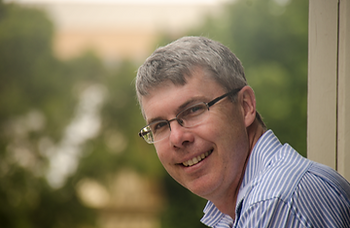
David Banney, Conductor
‘As a conductor, David Banney is simply one of the best in the country.’
Roger Woodward
‘...easily among the best half-dozen young conductors that
I have encountered in the forty years of my career.’
Vernon Handley, Conductor Laureate, Royal Philharmonic Orchestra
David Banney is Artistic Director of the Christ Church Camerata, Director of Music at Christ Church Cathedral, and Artistic Director of the Newcastle Music FestivaA past winner of the ABC Young Conductor of the Year Award, David has conducted many of Australia’s leading orchestras and ensembles, including the Queensland Symphony, the Queensland Philharmonic, the Adelaide Symphony, the West Australian Symphony, the Canberra Symphony and Opera Queensland. From 1999 to 2005 David was the conductor of the European Medical Students orchestra.
He has worked with many of Australia’s finest soloists, including pianists Ian Munro, Roger Woodward, Kathryn Selby, Simon Tedeschi, Evgeni Uganov and Tamara Anna Cislowska; soprano Amelia Farrugia; and violinists Graeme Jennings, Tor Fromyhr and Susan Collins. David’s teachers have included Patricia Pollett (viola) and Vernon Handley (conducting). As a violist David is a member of the Christ Church Camerata String Quartet, with whom his performances have included a direct broadcast on ABC Classic FM, concerts with pianist Roger Woodward, and a highly acclaimed chamber series at the Newcastle Art Gallery.
David’s compositions include orchestral, choral and chamber music, as well as music for documentary films. A deep interest in children’s music education was inspired by meeting Géza Szilvay, the great Hungarian violin pedagogue and creator of the Colourstrings curriculum. David has spoken at numerous conferences on the subject of music education, and has been published by Fennicca Gehrmann.
David enjoys a high profile as a public music educator, particularly through his radio program ‘Banney’s Baton Banter’, a weekly musical discussion on Newcastle’s ABC1233, several highly acclaimed lecture series at the Newcastle Art Gallery and a number of lectures for the Australian Decorative and Fine Arts Society. David’s compositions include works for orchestra, chamber music, and music for children, and his acclaimed ‘Tigers and Teapots’ collection of music for children has been performed by the Adelaide Symphony Orchestra, and future performances include a repeat by the ASO, and a concert series by the Hobart Chamber Orchestra.

Géza Szilvay, Patron
Géza Szilvay was born in Budapest in 1943. He studied the violin at the Béla Bartók Conservatory and violin pedagogic at the Budapest Music Academy, where he graduated in 1966. He also studied law and political science at the ELTE University in Budapest and took his doctor’s degree in1970.
Since 1971 he has been teaching the violin at the East-Helsinki Music Institute and since 1978 at the Sibelius Academy as well.
In 1984 he was appointed Principal of the East-Helsinki Music Institute. The renowned Helsinki Junior Strings (at present the Helsinki Strings) orchestra was founded by Géza Szilvay and the cellist Csaba Szilvay in 1972 and they have conducted the orchestra ever since until 2010. They recorded with the Helsinki Strings more than 30 commercial CDs under the label Finlandia and Warner Music.The Szilvay brothers have gained international recognition both as string pedagogues and as conductors and educators of children and youth orchestras.
In recognition of their work for youth culture they were awarded the Knight Order of the Finnish Lion in 1981, The Culture Prize of Finland in 1983, The Hungarian State Award for Cultural Activity in 1990, The Culture Prize of Helsinki Fazer Music Prize in 1995 and and the “Pro Musica” Award in 1999. Géza Szilvay was decorated with the prestigious “Accent” Prize of the Association of Finnish Music Institutes in 2005 and with the International Kodály Prize in 2007. In 2009 the President of Finland named Géza Szilvay as professor. In 2013 the President of Hungary decorated him with the Hungarian State Award (Magyar Érdemrend Tisztikereszt).
The Colourstrings approach, developed by the Szilvay brothers, has gained an international reputation and is now taught all over the world. A number of special Colourstrings institutions –schools, centres and societies- have been established in several countries in order to realize and further this child-centred teaching concept.
